Valentina Marchei @ Skate Canada
Part 1
 November 20, 2010
By Suzanne Herrmann (Suzie)
Photos © Suzanne Herrmann
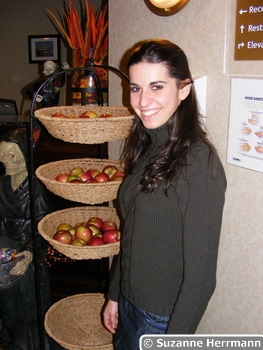 Valentina Marchei graciously sat down with me after a busy weekend of competition at Skate Canada to discuss her success of last season, training and her goals for moving forward this season. Vale’s pensive answers provide for an interesting conversation and her incredibly positive attitude is inspiring. As always, she was a pleasure to converse with!
Valentina Marchei graciously sat down with me after a busy weekend of competition at Skate Canada to discuss her success of last season, training and her goals for moving forward this season. Vale’s pensive answers provide for an interesting conversation and her incredibly positive attitude is inspiring. As always, she was a pleasure to converse with!
The day before this interview, I spoke to Valentina about the short program and how she has improved a lot. Her jumps have always been springy, but she was jumping even higher than the last time I saw her and she has added an arm above her head in the back-end of her triple Lutz-double loop combination. She did not complete the combination and had an uncharacteristic fall in her footwork sequence. Valentina told me that she was perhaps too excited for the short program and though she was not completely disappointed, she wished to have a stronger skate in the Long. I would imagine that after being out of the circuit for a bit, she was eager to return!
Suzie: Yesterday you told me a little bit about the short.
Valentina: Yeah.
Suzie: You probably don’t need to repeat that part; I’ll remember.
Valentina: I don’t even remember what I said about my short program. I’m disappointed with the fall on the steps; it’s my strongest part of the program.
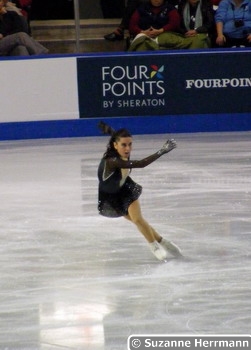 Suzie: You have a great step sequence!
Suzie: You have a great step sequence!
Valentina: Just didn’t have to happen but—thank you—but it happened. You know, just like a mistake on a jump, it can happen; that’s it. It’s just an experience. It’s just—it’s bad to say, but it’s just Skate Canada, ok? Of course it’s important, but it’s important for somebody to—it’s like the Grand Prix season is a goal of the season. I got Skate Canada 10 days ago. Of course I’m super happy because I’m back in the circuit and I didn’t expect to [have two events] and it’s not really my goal to get to the final because I’m not ready yet to get to the final. My goal is still Europeans. I take it as a good experience; a positive one, because I got to experience the atmosphere again, to see my friends and to let the judges to see me again because I was out for a while.
Still, from here we start to work because it’s a good international stage and we see what we can improve. Of course, we learn the same from the small internationals, but small internationals are different because you do them to get ready before the season, you know what I mean? The skaters are higher level skaters, but not as high as in a Grand Prix. It’s kind of easier and it’s kind of less stressful than a Grand Prix, so everything I did is a good start and I’m confident with that. It’s a long journey through Europeans that I’m enjoying and I’m taking it step by step.
Suzie: You moved up a place, correct?
Valentina: Yeah, one place; not by much (laughs).
Suzie: Like you said, you’re still working up to it so it wasn’t perfect but that’s ok.
Valentina: Yeah, well, you know, skating in the first group doesn’t improve confidence compared to [competing in] Nice. Of course I think about how it’s a different stage here and I probably skated differently. In Nice two weeks ago, when I had my personal best of 164 points, I skated a better—two better programs. [Valentina earned 164.10 points to finish in 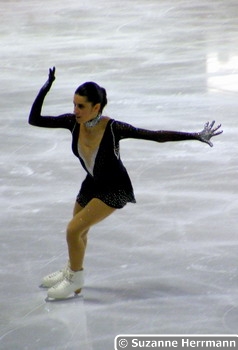 second place at the Coup de Nice in October, 2010]. I’m still happy with how I took this experience and proud of myself because in two days I could change my mind; I could change. I was kind of lost the first day, but then I was in a fight to the end in the long.
second place at the Coup de Nice in October, 2010]. I’m still happy with how I took this experience and proud of myself because in two days I could change my mind; I could change. I was kind of lost the first day, but then I was in a fight to the end in the long.
Now, I’m coming from clean longs and that makes me think that maybe if I do two clean every day, I should do four of them every day… or maybe I just need one. We’re still working on it. Maybe I’m too confident right now so that’s keeping my attention lower than what it’s supposed to be; or maybe I need more and more work because as I didn’t compete that much [in the past few seasons], I need to get used to competing again. That’s why I like to compete, that’s why I need to compete. That’s why I’m going to Russia [Rostelecom Cup] and then I’m going to do another international before nationals because I want to challenge myself. I want to see how I do in each event. Of course you don’t have to give up after the first mistake, you can still do a clean program.
Suzie: Alissa [Czisny] won [Skate Canada International 2010] with a fall.
Valentina: Yeah.
Suzie: Now, you have come a long way since last summer when I saw you skate.
Valentina: Thank you!
Suzie: A long way. Last year did you medal in every international event you entered? [Referring to the smaller international competitions, which I did not specify).
Valentina: Yeah, kinda.
Suzie: Then you won Italian Nationals.
Valentina: Yeah.
Suzie: How did that feel?
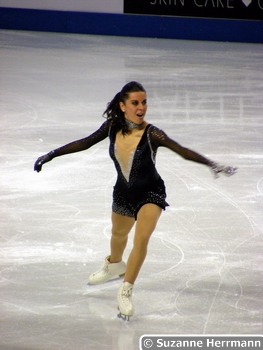 Valentina: It feels good because I feel confident about my skating. I know exactly what I’m going to do before [a competition]—one or two mistakes; if I’m ready, If I’m not ready. I’m in this stage of my career that it’s not all about medals or awards; it’s more about experience for life that makes me grow up even in my real life. It feels good, of course, because you’re one of the best and everybody likes to be one of the best but it’s still not enough to be in the elite group, you know? So it’s actually good to win this kind of [event], but it’s still nothing, you know? So you are nobody still.
Valentina: It feels good because I feel confident about my skating. I know exactly what I’m going to do before [a competition]—one or two mistakes; if I’m ready, If I’m not ready. I’m in this stage of my career that it’s not all about medals or awards; it’s more about experience for life that makes me grow up even in my real life. It feels good, of course, because you’re one of the best and everybody likes to be one of the best but it’s still not enough to be in the elite group, you know? So it’s actually good to win this kind of [event], but it’s still nothing, you know? So you are nobody still.
Suzie: I wouldn’t say that!
Valentina: It’s beginning, just the beginning, you know? So from there I can say, ok, I’m one of the best in this so to be even better, I should do this. That’s what judges are for. They can help you and give you advice. It was good that I came here because finally, I got them to see me and finally, they can tell me something because they saw me skating. So it’s—it’s good. From now until nationals, we still have two competitions and we’re going to work. If it doesn’t work [right away], this work that we are going to start is going to work later and that’s what I want because the end of January is my goal [Europeans].
Suzie: When you start a program, how long does it take you to feel like you can actually get through the program and not die halfway through it?
Valentina: In competition you mean?
Suzie: Just in practice even.
Valentina: Nah, in practice it’s normal that you die at the beginning, but if you know that you have to do a certain number of programs or certain number of pieces, when you’re going to be at that stage [competition], you’re going to be ready. I don’t even care anymore if I die and I’m not afraid to die before the end of the music because I know I’m going to be ready. My coach is good for that and I do believe in the work he does. If I don’t feel comfortable [with my program], I ask for one more run-through. The key was for me to do a lot of programs and to feel [one] with my music and with my programs. There is still the long program, which is completely new and I’m still working on it. It’s a challenge; everything I do is a challenge. It wouldn’t be exciting [otherwise].
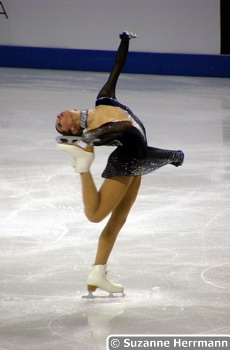 Suzie: I have bad habits of skipping spins in my program…
Suzie: I have bad habits of skipping spins in my program…
Valentina: Mmmm…
Suzie: …because they’re hard! Do you ever feel like you want to skip spins? You would probably get yelled at if you did!
Valentina: No, sometimes in practice I would love to skip! I learned to breathe during spins so I take them as a moment, not of relaxation, but where I can think about my program and where I can, you know, recharge myself, so I don’t see them as a bad thing…
Suzie: Do you count your revolutions when you’re in your spins?
Valentina: Yeah, I do, but I’m known as somebody who’s not able to count [revolutions]. For me, sometimes they’re a nine, but actually they’re a seven, so I don’t know how good my method of counting is!
(both laugh)
Suzie: I feel like I’d rather get the feeling of what it felt like to go around a certain number of revolutions than to actually try to count them… especially in a layback.
Valentina: Well, I count the colors that I see (laughs); the same color, and it works, but now I’m working more on [counting] because I’m really not able to count. It’s not easy for me to count—not even in spirals because I’m in my own world and I forget to count, so…
Suzie: How do you feel about the spiral sequence being cut back?
Valentina: It’s a shame because it was a lot of points, it was a lot of good points, an occasion to get points. Now of course you have to focus on more stuff; that’s why we’re going to see people who are going to improve spins, [other elements], speed and confidence, which is good because it’s an improvement for skating, too.
Suzie: I like to see the skaters who have good spiral sequences who carry speed with them and have nice positions.
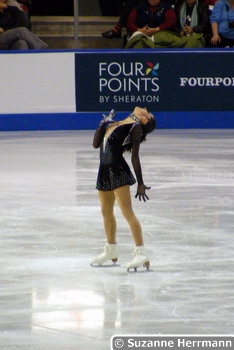 Valentina: Yeah, it’s kind of a shame that they take them out but we have time to show people other aspect of skating; interpretation, or steps, or whatever. You can still put them in—it’s your choice. You can take the time that you would like just as interpretation instead of [for points].
Valentina: Yeah, it’s kind of a shame that they take them out but we have time to show people other aspect of skating; interpretation, or steps, or whatever. You can still put them in—it’s your choice. You can take the time that you would like just as interpretation instead of [for points].
Suzie: I’m disappointed on the one hand because I earned a lot of points with a level four, but at the same time, I have more time for other elements in my program.
Valentina: You will have to improve in speed, you will have to improve in other things, but it’s ok because they are still worth points. No, there are no levels and of course [the sequence is now worth less points], but if you have a clean landing or a clean jump, then you can gain the points [back that you would have earned on the spiral sequence]. It’s not a problem; it’s not a big deal, the spiral. It’s just a spiral. Come on. You do a better spin and you focus more on the technical things.
Check out part 2 where Suzie and Valentina discuss the rule changes for spins and her new long program!



